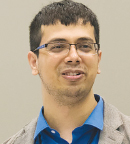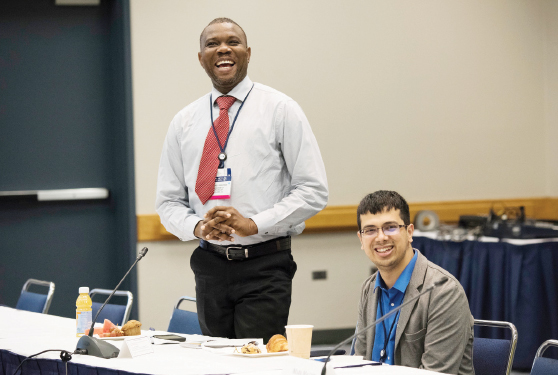
Bishal Gyawali, MD
Institution: Postgraduate trainee and PhD candidate in medical oncology, Department of Clinical Oncology and Chemotherapy, Nagoya University Graduate School of Medicine
Member since: 2014
ASCO activities: Virtual Mentors, Journal of Global Oncology editorial fellow
Of the many activities ASCO conducts to improve global cancer care, one of the most recent additions is the Virtual Mentors (VM) program. This program pairs a mentee oncologist from a low- or middle-income country (LMIC) with a mentor from a high-income country (HIC) and facilitates clinical and/or research collaborations between the pair, possibly for a long-term future.
When the pilot VM program launched in 2015, I was extremely excited about it. This program represented a wonderful opportunity to learn from world-class experts on a one-to-one basis without actually having to spend a dollar or travel a mile. What more could one ask for?! I was delighted when I was selected for the pilot program, becoming one of the very first mentees in the ASCO VM program.
Important Lessons Learned
I was paired with Mahesh Y. Iddawela, MBBS, FRACP, MRCP, a mentor based in Australia, and we discussed various career paths including both clinical and research activities. I was receiving my training in Japan, so clinical knowledge as such was not an issue, but implementing that knowledge in the setting of a low-income country, Nepal, was a big challenge. Dr. Iddawela, who is originally from Sri Lanka, understood this well, so it was easy to discuss these issues.
Another challenge for me was academic research and publication. I had come from a medical schooling culture in Nepal—where conducting research and publishing in medical journals were virtually nonexistent—to Japan, where patience is considered the utmost virtue. Thus, despite having interests and ideas on cancer policy and global oncology, I was not active in academics. Not having an English-speaking mentor around didn’t help, either.
Being accepted into the ASCO VM program changed my career completely. Once I started having conversations with Dr. Iddawela about various ideas that I had, I started to become more proactive and we began working on a few papers. Three such papers have been published in major oncology journals. I learned a career-defining lesson from this experience: I didn’t have to think locally, I could think globally—and chase any dream I had.
Indeed, as oncologists from LMICs, we usually don’t have the means or confidence to dream big, beyond our borders. Through the VM program, I gained the confidence to speak out about my ideas and ambitions and seek out the means to make them come true. I understood the importance of online platforms to make connections and build collaborations. The VM program taught me that no dream was too big to chase. That inspiration was the most important takeaway from the VM experience.
Participate in 2018 Virtual Mentors
Applications for prospective mentors and mentees for the 2018 Virtual Mentors program are currently open and close September 30, 2017. Visit asco.org/international-programs and select International Professional Development Opportunities to find complete eligibility criteria and submit your application.
Using that experience and confidence, I now have many virtual mentors. Thus, the ASCO VM program didn’t just give me one mentor—it taught me the skills and gave me the means to connect with all the mentors I need. Today, I have collaborations with mentors and colleagues from a number of institutions and countries, including the United States, Canada, the United Kingdom, Italy, Australia, Japan, and Nepal. These collaborations have led to my authoring and coauthoring more than 40 journal articles—all within the past 3 years.
These papers are not the only marker of success. Participating in the ASCO VM program informed me more of ASCO’s international activities. As a result, I also applied to and was selected for the Journal of Global Oncology Editorial Fellowship this year.
I hope to use the skills, knowledge, and experience I have gained through the VM program to improve cancer care not only in my own country, but also around the world. Using my firsthand experience with cancer care in both LMICs and HICs, I collaborate with colleagues from LMICs like Nepal, India, and parts of South America to discuss challenges and help with cancer cases and research activities. Using online tools, I have now participated in tumor boards for many hospitals in LMICs and shared my experience.
Continuing ASCO’s VM Program
My belief is that we all can be virtual mentors and virtual mentees in our own ways. When I try to imagine my career path without the ASCO VM opportunity, I realize that there are many oncologists in the world who need this opportunity. Although I am still a trainee myself, I try to reach out to other colleagues and help them with whatever I can.

Dr. Gyawali (right) and Dr. Oluwole Babatunde (left) will serve as the first Journal of Global Oncology editorial fellows.
I encourage every oncologist from an LMIC to participate in ASCO’s VM program, as it is a unique and life-defining experience. I also strongly encourage experienced oncologists from HICs to volunteer as mentors. In my case, I had to wait for a long time before ASCO found a mentor for me, and that was a little saddening. Prospective mentors should look at ASCO VM as an important opportunity to learn more about global oncology firsthand by discussing cases and careers with their mentees. Working in a high-resource setting, it is easy to forget how difficult it is to practice oncology in a resource-constrained setting without the help of modern investigations, drugs, or referral facilities. This can be a great learning opportunity for the mentee to embrace the progress from HICs and a humbling experience for the mentor to comprehend the gulf between the two parts of the world. Thus, it is more of a learn-learn experience rather than a one-way pedagogy.
When oncologists in HICs and LMICs work together, we have the best chance of addressing the common needs of patients with cancer across the globe. ■
The Virtual Mentors program is supported in part by the Conquer Cancer Foundation of ASCO.
Originally published in ASCO Connection. © American Society of Clinical Oncology. “Shaping Real Careers With Virtual Mentorship.” ASCO Connection, September 2017. All rights reserved.

